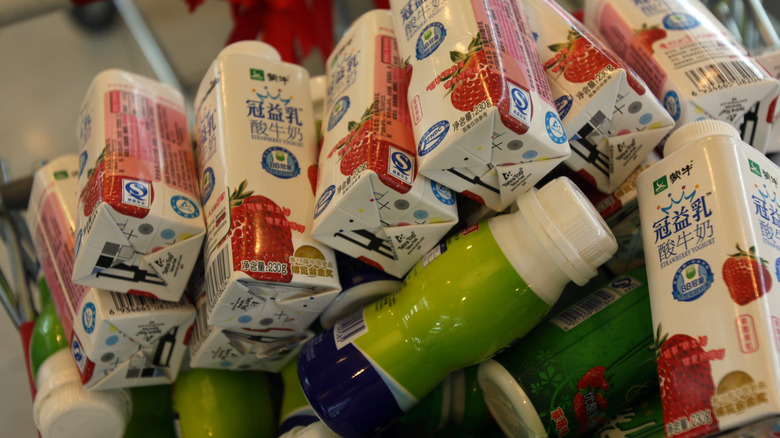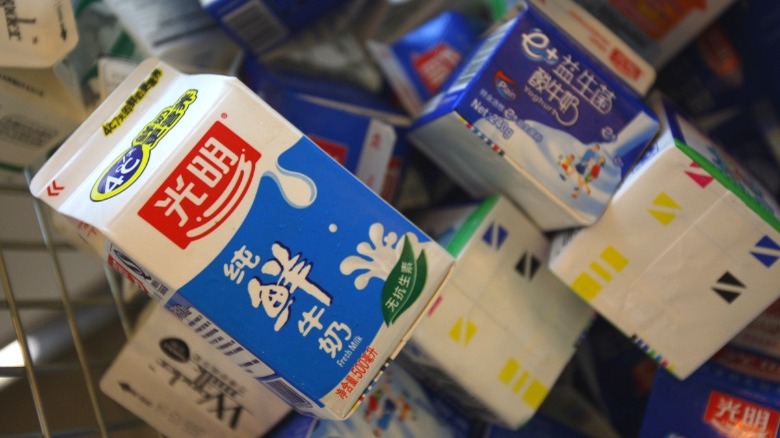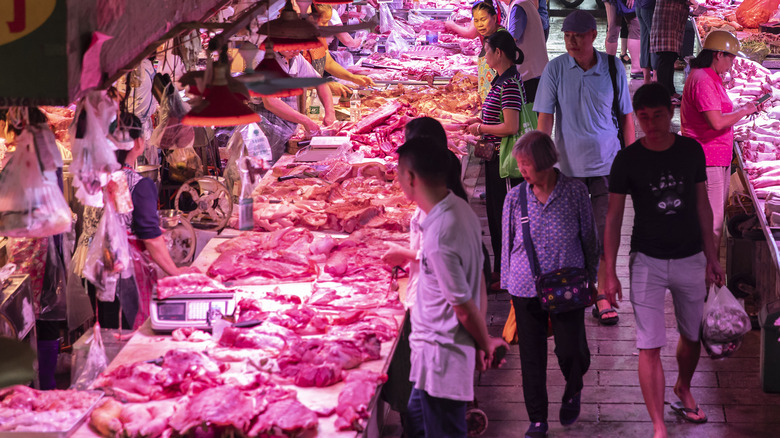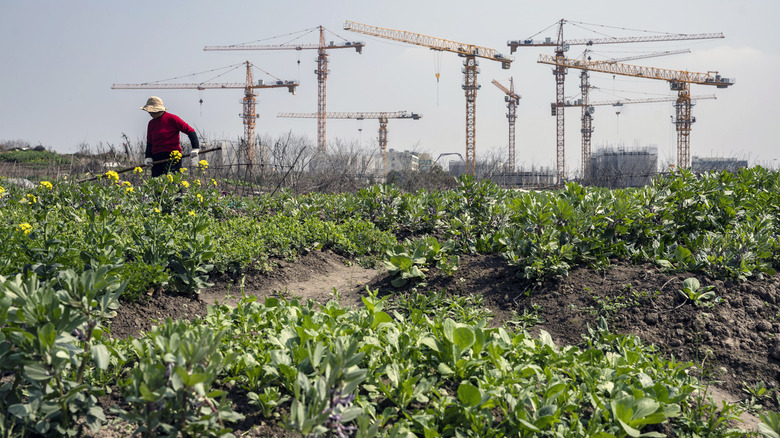Why Some Chinese Consumers Don't Trust The Food In Their Grocery Stores
There are few events as heart-stopping as a food recall. In the U.S., the FDA often issues a recall alert when undeclared allergens like wheat, nuts, milk, or soy make it into an unrelated food item; when food is contaminated (or may have been contaminated) with potentially dangerous bacteria like listeria or salmonella; and the truly frightful moments when foreign objects (from small pieces of glass, plastic, or metal fragments) inadvertently get into the food supply. But consumers in China have seen multiple food scares in their lifetimes, the scale and seriousness of which can make some of these recalls pale in comparison.
In 2012, then South China Normal University professor and Fulbright scholar Tang Hao wrote: "In a little over a decade, we have seen alcohol which is actually methanol; seafood soaked in formalin ... and gelatine rendered out of used shoe leather. Now even the capsules used to deliver drugs have been found to contain toxins," (via China Dialogue).
He adds: "None of us can be certain that any foodstuff or drug is safe, from baby milk powder through to cooking oil ... Consumers were originally shocked. Now, they are simply numb. It seems the Chinese have got used to poisoning each other."
China's consumers have lived through head-turning food scandals
One of China's most egregious food safety scandals took place in 2008, when the chemical melamine was added to infant milk powder, sickening 300,000 children and killing six, as reported by BBC. The ingredient was added in order to make it seem like there was more protein in the milk — but under normal circumstances, it is used as an ingredient in plastic, fertilizers, and concrete. In 2014, Heinz was caught up in a similar scandal when suppliers in China sold skimmed soybean powder with high levels of lead which were added to baby cereal (via Insider).
A recurring problem involves the production and sale of "gutter oil" or "swill oil" — cooking oil made by taking kitchen grease discarded by restaurants and reprocessing it before reselling it to thrifty food vendors. This oil is said to be indistinguishable from the real thing, and at one point was used in an estimated 10% of food cooked across the country (via Grist). While the practice was meant to be outlawed much earlier, China was still reporting crackdowns on the practice in 2017 (via Reuters).
China's food safety laws haven't won over many consumers
In response to these food scares, China enacted its Food Safety Law in 2015, which sought to oversee the production, sale, export, and import of consumables across the country. It also detailed more than 200 standards meant to cover everything from hygiene to labelling and packaging (via Baker Mckenzie).
But members of China's middle class are not convinced, and the laws have not made the food scandals of the early 2000s easier to forget. Insider spoke to Tian Hao, who indicates he has given up on most commercially sold food items, from meats to produce. He has chosen instead to go straight to the source; Tian (like many other Chinese consumers) orders food from small farmers who deliver groceries — from vegetables to chickens — from their farms directly to middle class tables.
Going straight to the source can be trying on the budgets. Tian shares he has paid $28 for chicken, when $8 would be enough to pick up the same item at the wet market. But in his mind no compromise is worthwhile, particularly when it comes to feeding his child. "When she [Tian's daughter] was born, I started paying attention to what we're eating. Quality of our food is a big concern for the middle class in China, especially if you have a family. Everyone in every city worries about this, whether you are in Shanghai, Beijing, Shenzhen, or Chengdu," the office worker stated.
Chinese consumers are reaching out to farmers directly
Canadian researcher Dr. Si Zhenzhong says many of the rural-farm-to-urban-table connections seen today are organic because, "A lot of Chinese urban people still have relatives in the countryside. In four decades, China tripled its urbanization rate from 20% to 61%. The US spent 100 years reaching that increase" (via Insider).
For those that don't know where to start, there is literally an app for that. E-commerce platform Pinduoduo connects consumers with producers, allowing farmers to sell their wares direct. The company's senior vice president Andre Zhu told Pandaily: "We've seen the farm-to-table trend become a widespread movement by using technology to match small producers with consumers. Shortening [sic] the time between harvesting and cooking ensures the freshness and the safety of the products." Like grocery delivery service Instacart, Pinduoduo found its place when the coronavirus pandemic struck. It now has 12 million farmers serving 731 million consumers.
China faces a serious water problem
Even though Chinese consumers have been able to get around the problem of finding trustworthy food supplies by going straight to the source, it may not be long before the country needs to confront an even more serious problem than the ones generated by shady food manufacturers.
As author Hal Brands points out in an op-ed for Bloomberg, the same economic movement that created a middle class nearly overnight has also resulted in an environmental time bomb. Brands says that not only does China have 20% of the world's population and "only 7% of its fresh water," he also notes that, according to some estimates, "80% to 90% of China's groundwater and half of its river water is too dirty to drink; more than half of its groundwater and one-quarter of its river water cannot even be used for industry or farming."
That is a problem not only China in particular, but Asia as a whole, will need to reckon with — and find a solution for — in the not-too-distant future.




